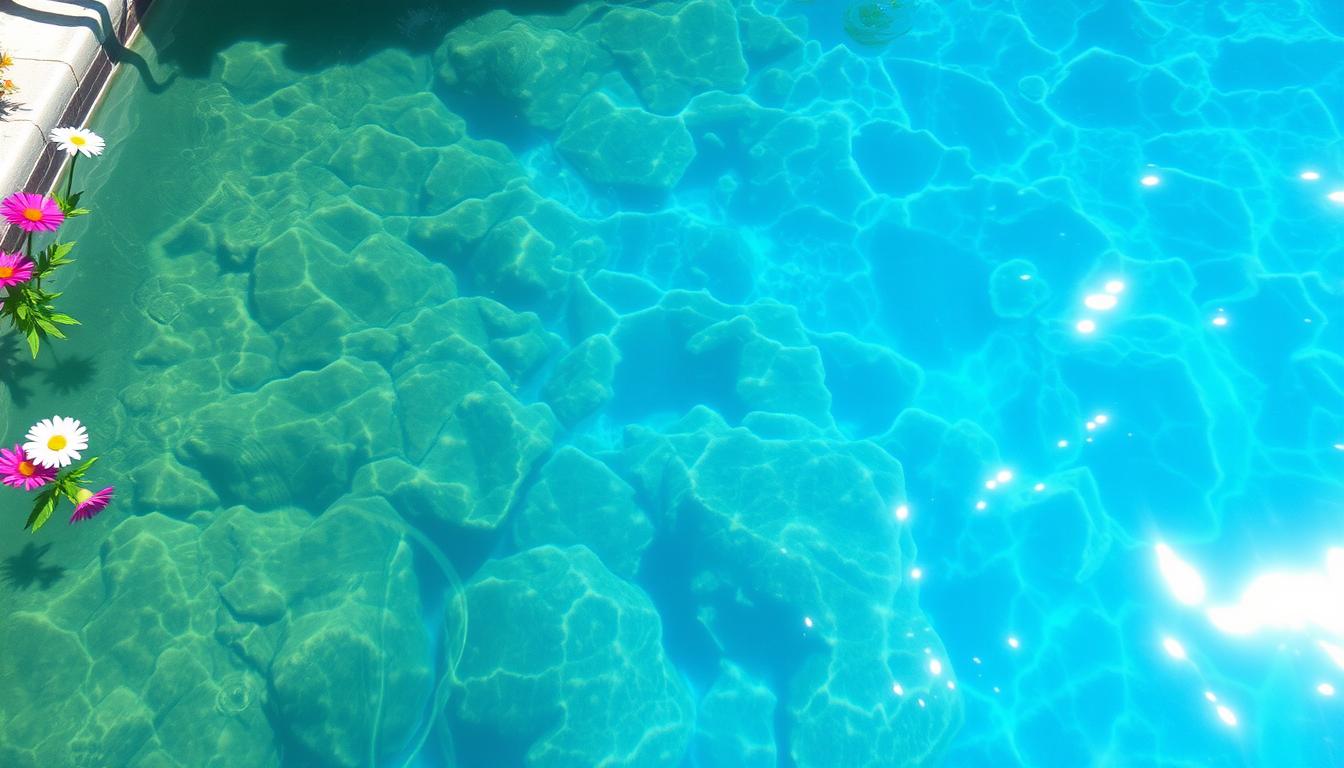
Is your pool water blue and cloudy? Many pool owners face this issue. It often stems from poor water chemistry and maintenance. Cloudy water looks unappealing and can pose health risks.
Don’t fret! You can fix this problem in a few days. We’ll explore common causes of cloudy pool water. These include low runtime, chemical imbalances, algae growth, debris, and high calcium levels.
We’ll also provide solutions for each issue. Our goal is to help you maintain clear, safe pool water. You’ll soon have a sparkling pool to enjoy with your family.
Understanding pool water maintenance is key. Regular testing and adjusting chemical levels are crucial. Optimizing your pool’s filtration system is also important. These steps will help you tackle cloudiness effectively.
Let’s dive in and learn how to keep your pool crystal clear. With the right knowledge, you’ll be proud of your sparkling clean pool!
Key Takeaways
- Cloudy pool water can be caused by low runtime, chemical imbalances, algae growth, excess debris, and high calcium levels.
- Maintaining proper chemical levels, such as chlorine, pH, alkalinity, and calcium hardness, is crucial for pool water clarity.
- Running your pool filter for at least 8 hours a day and backwashing it regularly can help prevent cloudiness.
- Addressing specific issues, such as algae growth or high pH levels, may require targeted treatments like algaecides or pH minus chemicals.
- Regular pool maintenance practices, including testing, adjusting chemicals, skimming, vacuuming, and backwashing, are essential for maintaining crystal-clear pool water.
Common Causes of Cloudy Pool Water
Cloudy pool water can be frustrating for pool owners. It makes the pool less inviting and may signal water chemistry issues. Let’s explore the main causes and solutions for this problem.
Low Runtime and Inadequate Filtration
Insufficient filtration is a key reason for cloudy pool water. Pools need to run for at least 8 hours daily. Backwash the pool weekly to keep the filter system working well.
Chemical Imbalances in Pool Water
Low chlorine or unbalanced chemicals often cause cloudy water. Test pool water to check chlorine levels and adjust as needed. This can clear up cloudy water in 2-3 days.
Proper chemical balance is crucial for clear water. Too much chlorine can also make water cloudy. Finding the right balance is key.
Algae Growth in the Pool
Algae can stain pool surfaces and require special treatment. It comes in various colors, not just green. To treat algae, identify its color and use the right algaecide.
Also, use a clarifier to help clear the water. Make sure chlorine levels are adequate before treatment.
Excess Debris Accumulation
Too much debris uses up chlorine and affects water quality. Skim the pool often and vacuum to remove debris. Backwash the filter regularly to maintain clear water.
Keep your pool clean by emptying skimmer baskets and backwashing the filter. This helps prevent cloudy water and keeps your pool inviting.
| Cause | Solution |
|---|---|
| Low runtime and inadequate filtration | Run pool for at least 8 hours a day and backwash filter weekly |
| Chemical imbalances in pool water | Test water, adjust chlorine levels, and maintain proper chemical balance |
| Algae growth in the pool | Identify algae color and use corresponding algaecide with clarifier |
| Excess debris accumulation | Skim pool regularly, vacuum, and backwash filter to remove debris |
why is my pool water blue and not clear
Blue but cloudy pool water can be caused by several factors. Understanding these causes helps you restore your pool’s clarity. Let’s explore common reasons and solutions for this issue.
High Calcium Levels in the Pool
Excess calcium can make pool water cloudy and form scale. To fix this, add a clarifier to help the filter catch calcium particles. Another option is to partially drain and refill the pool with fresh water.
Maintaining proper pool chemistry prevents calcium buildup. This is key to keeping your water crystal-clear.
Elevated pH Levels
Pool water may turn cloudy when pH levels exceed 7.8. If tests show high pH, add a pH minus chemical. This brings it back to the ideal range of 7.2 to 7.8.
Circulate the treated water for 24 hours to see improved clarity. Check alkalinity too, as it helps stabilize pH levels.
Damaged DE Filter Screens
DE filters use fine white powder for better filtration. Damaged screens can let powder escape back into the pool, causing cloudiness.
To fix this, replace the torn or broken internal screens. This ensures effective filtration and keeps DE powder out of your pool.
| Pool Water Parameter | Recommended Range |
|---|---|
| Free Chlorine | 1-3 ppm |
| Bromine | 2-6 ppm |
| Total Alkalinity | 80-120 ppm |
| pH | 7.2-7.8 |
| Calcium Hardness | 200-400 ppm |
| Cyanuric Acid | 30-50 ppm |
Regular monitoring of these key pool water parameters prevents common problems. Proper chemistry, filtration, and maintenance keep your pool water blue and clear. This ensures an inviting swimming environment all season long.
Effective Solutions to Clear Cloudy Pool Water
Identifying the cause of cloudiness is key to restoring pool water clarity. Maintain chlorine levels between 1-3 ppm for proper disinfection. Regularly test and balance pool chemistry to prevent imbalances that can cloud water.
Improve water clarity by addressing filtration and circulation issues. Run the filtration system for at least a day to remove particles. Clean or backwash the filter every few days for better results.
Vacuum the pool weekly to remove debris. Use a pool shock treatment during deep cleaning to raise sanitizer levels quickly. These practices can clear cloudy water within 1-3 days.
If you’re unsure about the proper steps, seek guidance from a pool store. They can help you find the most effective approach to restore your pool’s clarity.







